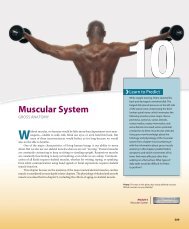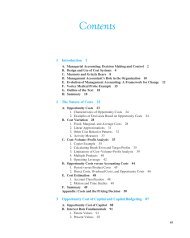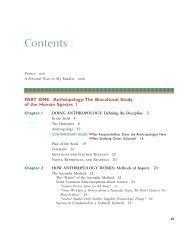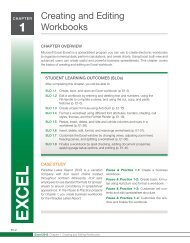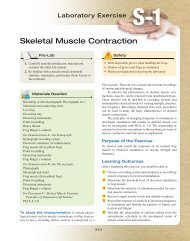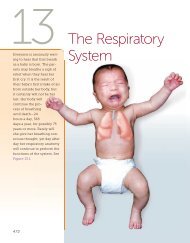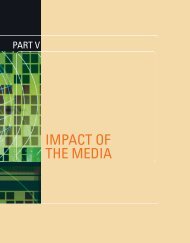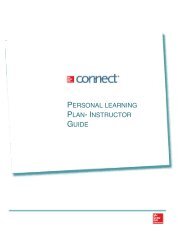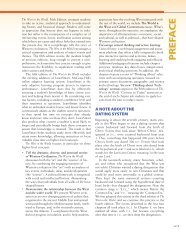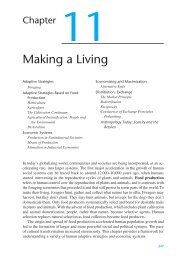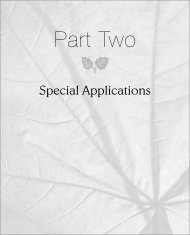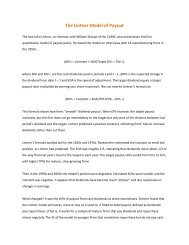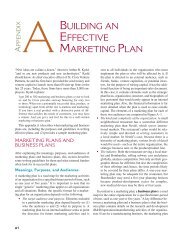La vie quotidienne et les loisirs
La vie quotidienne et les loisirs
La vie quotidienne et les loisirs
You also want an ePaper? Increase the reach of your titles
YUMPU automatically turns print PDFs into web optimized ePapers that Google loves.
Grammaire <strong>et</strong> exercices<br />
2.1. Use your PF to re<strong>vie</strong>w forms of<br />
faire in verbal expressions for leisure<br />
activities. As you make remarks and<br />
ask personalized questions, work<br />
in the various subjects and write<br />
examp<strong>les</strong> of all forms on the board.<br />
Students need extra help binding<br />
faire when it means to do. Point out<br />
this meaning in the context of plans,<br />
invitations, and habitual actions.<br />
Qu’est-ce que vous allez faire ce<br />
week-end? Qu’est-ce que vous<br />
faites après le cours aujourd’hui?<br />
Qu’est-ce que vous faites quand<br />
vous avez un examen? Remind<br />
students that the answer to such<br />
questions is generally a different<br />
verb rather than faire itself. Note<br />
that in nous faisons only, -ai- is<br />
pronounced as a schwa or “mute<br />
e.” In informal French, this [ə] may<br />
be dropped: [nufzõ]. Note also that<br />
the pronunciation of -ai- in vous<br />
faites differs from -ai- in the singular<br />
forms: faites rhymes with fête.<br />
✶<br />
Re<strong>vie</strong>w vocabulary for<br />
weather in the Vocabulaire,<br />
Chapitre 2.<br />
✶<br />
Re<strong>vie</strong>w expressions with<br />
faire in the Vocabulaire,<br />
Chapitres 1 and 2.<br />
Ex. 1. Use for partner practice after<br />
assigning as homework. Remind<br />
students that the answers will usually<br />
require different verbs.<br />
ES 1. Do input with faire (to do)<br />
to discuss habitual action: Qu’estce<br />
que vous faites le samedi<br />
d’habitude? Avant d’aller à une<br />
fête? Avec vos amis? Quand il<br />
neige? Quand vous êtes fatigué(e)?<br />
Le vendredi soir?<br />
90<br />
2.1<br />
Talking about activities and weather:<br />
The verb faire<br />
A. Faire is one of the most frequently used verbs in French. In addition to its basic<br />
meanings, it is used in many idiomatic expressions. Here are the present-tense<br />
forms.<br />
Pronunciation Hint<br />
fais/, fait/, faisõn/s/, faite/s/, fõn/t/<br />
faire (to do; to make)<br />
je fais nous faisons<br />
tu fais vous faites<br />
il/elle/on fait ils/el<strong>les</strong> font<br />
B. Use the verb faire to ask what someone is doing or what work people do.<br />
—Qu’est-ce que tu fais ce soir? What are you doing tonight?<br />
—J’écoute un nouveau CD. I’m listening to a new CD.<br />
—Que fait ton frère?<br />
—Il travaille dans un restaurant.<br />
What does your brother do?<br />
He works in a restaurant.<br />
C. Another important use of faire is to talk about the weather.<br />
—Quel temps fait -il?<br />
—Il fait mauvais.<br />
What’s the weather like?<br />
The weather is bad .<br />
D. Faire is used in many expressions that name specific activities (faire une<br />
promenade, faire du camping).<br />
Au lac, nous faisons de la voile.<br />
At the lake, we go sailing .<br />
Je fais de l’anglais pour être I’m studying English in order<br />
professeur d’anglais. to be an English teacher.<br />
Exercice 1 Les activités<br />
Complétez <strong>les</strong> questions par la forme correcte de faire <strong>et</strong> puis répondez.<br />
1. Est-ce que tes copains aussi _____ du français? Ou est-ce qu’ils _____<br />
de l’espagnol?<br />
2. Qu’est-ce que tu _____ comme études? Tu _____ de la chimie, de<br />
l’économie, de la littérature?<br />
3. Que _____ ta mère? Elle travaille dans un bureau?<br />
4. Que _____ ton père? Où est-ce qu’il travaille?



